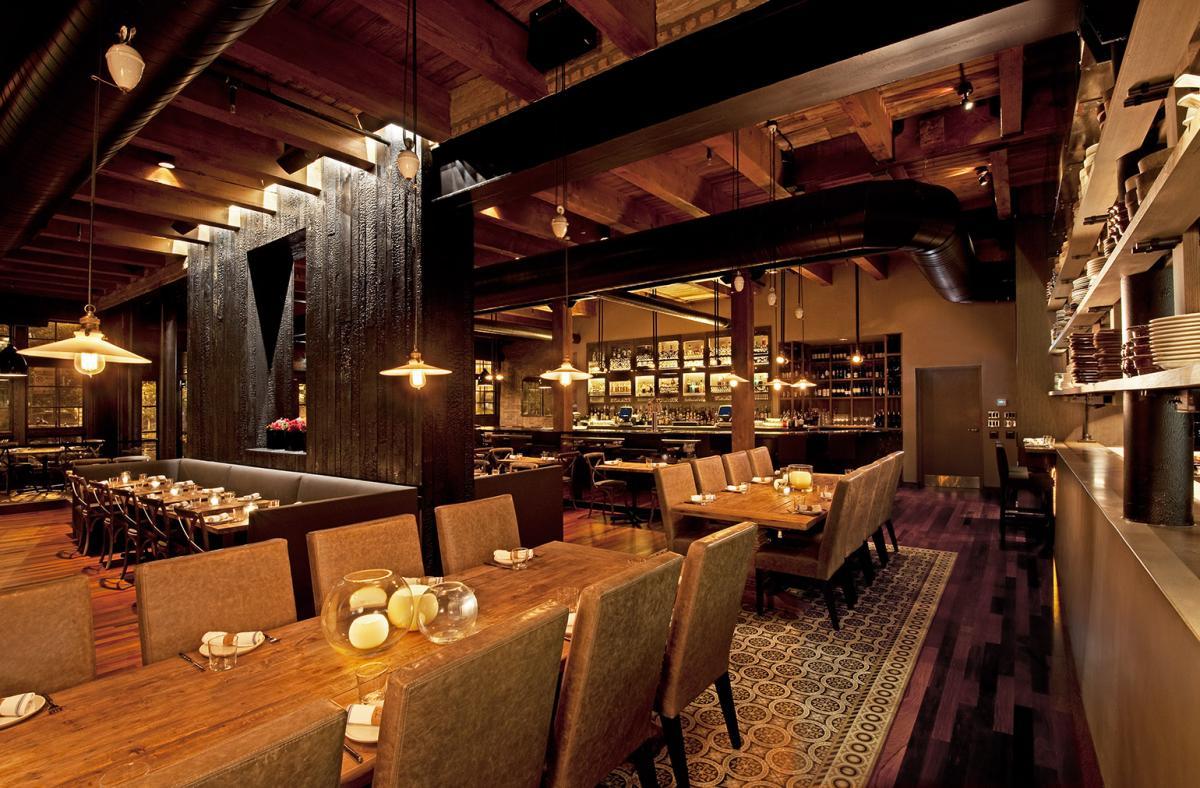
Apr 6, 2018
Leslie Wu | Forbes | March 31, 2018
Opening night at a restaurant can be fraught with peril — thanks to Yelp and social media, backlash over perceived flaws are immediately shared within hours of opening, and a restaurant staff has less time than before to get their bearings.
Kevin Boehm and Rob Katz, cofounders of Chicago’s Boka Restaurant Group plan out each opening with precision, trying to anticipate potential minefields — a luxury of larger budgets compared to their first starts. “I think in the old days, when you were running out of cash, and you were like ‘We’ve got to open up now!’, that was when you saw the problems. We open when we’re ready now, and we add that in as part of the budget,” says Boehm.
This planning stage translates to significantly more time in the space for all the staff to get acclimatized. “In the old days, we had to get inspected, pass inspection, and then open in two days,” recalls Boehm. “Now, once we pass inspection, we like to have a certain number of days in the space before we actually open up a restaurant: 30 days of front of house training, 17 days with the chefs inside of the finished space cooking, two days of staff on staff, and three or four practice dinners before we even open up the doors. At this point, we don’t like unknowns.”
It hasn’t always been this easy, however — over the years, Boehm and Katz have learned a lot about the trials and tribulations about the owner/operator life. For those who may be considering opening a restaurant, here are five tips from the trenches as to planning the big day and beyond.
1. Build the foundations as soon as possible.
At the beginning of their partnership, Boehm and Katz tried to take care of all the minutia by themselves, instead of letting others pitch in. “We truly ran ourselves into the ground, to the point where we were close to nervous breakdowns. And what we needed to do, as we expanded — and we should have done it faster — was build our infrastructure,” says Katz. “Instead, we basically hoarded our information and did not delegate properly because we just didn’t have faith and trust in anyone else. When we finally did, it turned out to be the greatest thing that ever happened to us.” [For more tips on delegation, read How Two Workaholic Entrepreneurs Learned Work Life Balance And Delegation].
2. Sweat the small stuff.
Fussing with the chair selection and table placement for the first day comes naturally to a new restaurateur, but to keep up that eagle eye as the weeks or years go on can be a challenge. For Boehm and Katz, however, being vigilant is key. “It’s just one thing, paying attention to the details in the restaurant business is absolutely imperative, because the margins are so small, there’s so very little room for error,” says Katz.
CONTINUE READING

Mar 30, 2018
Elliot Richardson | Crain’s Chicago Business | March 15, 2018
New restaurants spur economic development and create jobs in communities across the state. They bring people into neighborhood business districts and expose patrons to nearby retailers and small businesses. Unfortunately, entrepreneurs attempting to open an establishment in Illinois face an archaic law that prohibits them from serving alcohol within 100 feet of a religious institution, school, hospital or military station.
This law stymies the growth of local economies, often in areas where new opportunities are needed most. And it paints all communities with a single brush instead of allowing local leaders to determine the restrictions that best serve their businesses and residents.
The Liquor Control Act of 1934 became law in Illinois shortly after the 18th Amendment was repealed. It prohibits the sale of alcohol within 100 feet of the institutions identified above but provides restaurants the opportunity to procure a specific exemption for their establishments. However, obtaining an exemption takes an actual act of the Illinois General Assembly.
Specifically, for a single business to receive an exemption, a bill must be drafted, passed by the Legislature and signed into law by the governor. Most small-business owners simply don’t have the time or resources to tackle this burdensome process.
In the 84 years since this became the law of the land, only 75 businesses have been granted such an exemption.
CONTINUE READING

Mar 22, 2018
Jillian Kramer | Food & Wine | March 15, 2018
“Match the restaurant to the location.”
We’ve all seen it happen: one day, there’s a brand-new restaurant around the corner that we can’t wait to try and the next day, that same restaurant is closed—for good.
Statistics paint a grim picture for anyone who dreams of opening a restaurant. In New York, for example, 80 percent of restaurants fail within five years. And regardless of their location, about 60 percent of restaurants close in the first year, one study shows.
Luckily, from those failures come lessons—and two restaurateurs, who now own successful spots, are here to share what they learned from their own shutterings.
“Match the restaurant to the location.”
When James Groetzinger, who owns Warehouse and Calhoun Street Tavern, opened Parlor Deluxe in 2015, “it was a little bit ahead of its time for the location,” he says. “The location was on a one-way street with no nearby parking lots, making it street parking only. It was also before a lot of construction was moving farther up town, so we weren’t getting a ton of foot traffic passing by.”
But since the restaurant closed in 2016, “the street has become a two-way,” Groetzinger says, “and they’ve built a huge parking deck a couple blocks over.” Had Groetzinger waited another year to launch the restaurant, he might have had better luck, a lesson in choosing the right location.
“Eliminate dress codes.”
Carl Sobocinski, owner of Table 301 Restaurant Group, believes today’s diner wants to dress casually—but two of his former restaurants, Restaurant O and Devereaux’s, had dress codes. “I never thought they were that strict but the patrons who were turned away did, and they were sure to tell their friends that we had a dress code,” he says. (The restaurants’ dress code included no shorts, no flip-flops and no baseball caps.)
“The [no shorts rule] was the biggest issue with patrons because we are in South Carolina where summer nights are humid and can reach temperatures in the 90s, even during dinner hours,” he says. Lesson learned: “We dropped the dress code after a few months, but the damage was already done.”
CONTINUE READING

Mar 16, 2018
Ashok Selvam and Daniel Gerzina | Eater Chicago | March 14, 2018
Chicago’s food and beverage industry netted 10 nominations this morning when the James Beard Foundation announced its finalists for the 2018 awards from Philadelphia. Boka Restaurant Group scored the most of the city’s finalist nominations as Rob Katz and Kevin Boehm’s company — which runs restaurants including Boka, Stephanie Izard’s Girl & the Goat, and Momotaro — were recognized four times, including for Outstanding Restaurateur.
Last year, 10 Chicago-related restaurants, chefs, and bartenders also made it to the finalists’ round. Twenty-eight were Beard semifinalists this year, as revealed in February. The awards ceremony, known as the “Oscars of the food world,” will take place on May 7 at the Lyric Opera of Chicago for the fourth-straight year.
Chicago chefs were nominated 13 times as semifinalists in the Best Chef: Great Lakes category which covers Illinois, Indiana, Michigan, and Ohio. All five finalists are from Chicago: Andrew Brochu (Roister), Abe Conlon (Fat Rice), Beverly Kim and Johnny Clark (Parachute), David and Anna Posey (Elske), and Lee Wolen (Boka). For Conlon, Kim and Clark this was their second-consecutive year they were named finalists. For Wolen, it was his third-straight finalist nomination. Sarah Grueneberg (Monteverde) won the award last year.
Tony Mantuano (Spiaggia) and Carrie Nahabedian — who recently announced the relocation of Naha — didn’t make it to the list of finalists for Best Chef. Chicago was also shut out of all of all of the beverage categories, so Lost Lake, The Boarding House, and Charles Joly did not move on to the finalist round. Meanwhile, HaiSous and Mi Tocaya Antojería didn’t make it as finalists in the Best New Restaurant category.
CONTINUE READING

Mar 10, 2018
Kellie Ell | CNBC | February 18, 2018
For better or worse, new eateries and the attention they attract have turned the restaurant business into a boom town, restaurateur David Chang told CNBC in a recent interview.
Chang, who owns 23 restaurants around the globe in such cities as New York City, Los Angeles, Sydney and Toronto, recalled a time when it wasn’t always this way. He spoke to CNBC from Pyeongchang, South Korea, the site of this year’s Winter Olympics.
“I remember trying to find leases and people were like, ‘No. We don’t want a restaurant in our building. It’s going to decrease the value because of problems with smells or whatever,'” Chang said of the first restaurant he tried to open back in 2004 in New York City. “And now, everyone wants a restaurant. Restaurants now are anchor tenants in buildings. That’s a joke.”
Today, restaurants and food establishments might occupy between 20 and 40 percent of a shopping center. A decade ago it was closer to 10 or 15 percent, according to commercial real estate and investment giant CBRE Group.
Gone are the days when the public embraced a (now largely debunked) myth that the overwhelming majority of new restaurants fail in the first year. “The problem is, there are too many restaurants,” Chang said.
“The whole idea that food is hotter than ever before because people just realize that with the younger generation, that’s where marketing dollars, real estate dollars, everything is coinciding with how people eat,” the Korean-American chef told CNBC
CONTINUE READING





